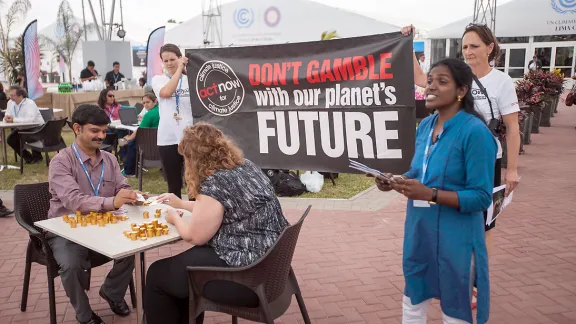
ACT Alliance climate campaigners staged a protest
LWF COP 20 Delegate Kopp Says Mobilizing Churches Is Key to Pushing for Commitments
LIMA, Peru/GENEVA, 16 December 2014 (LWI) –-The failure by governments at the Peru climate conference to deliver a concrete and clear roadmap to reduce global warming places an urgent responsibility on people of faith to increase their advocacy for decisive political commitment ahead of the 2015 United Nations (UN) summit in Paris, says Mr Martin Kopp, The Lutheran World Federation (LWF) advocacy officer for climate change.
“While the text of the ‘Lima Call for Climate Action’ might come as a blow to the advocacy efforts of the civil society, the [mobilization] over the past few months demonstrate that a true social movement on climate change is being born and that believers can be a strong and committed part of it,” Kopp said of the 1-12 December climate change negotiations in the Peruvian capital.
Reflecting on the outcome of the 20th session of the Conference to the Parties (COP 20) to the UN Framework Convention on Climate Change, Kopp emphasized LWF’s role in continuing to “mobilize our member churches to advocate, especially in countries key to the negotiations and raise awareness at church leadership and membership levels.”
He sees the 2015 UN climate summit and COP 21 negotiations in Paris as “wonderful opportunities for the LWF to deepen its commitment for climate justice by being both the voice of the voiceless and the hands working for low-carbon development and climate resilience.”
At the COP 20 talks in Lima, Kopp and other members of the LWF delegation to the UN climate change conferences joined in discussions and led advocacy actions. This included a Vigil for the Climate to mark the end of one year of the monthly Fast for the Climate campaign by the LWF and other religious and environmental groups around the world.
Lack of Political Will
“The negotiations in Lima had revealed no sense of urgency, portrayed a lack of trust between the rich and poor countries, and the text adopted by the 195 parties to the UNFCCC presented a mere call, ‘if not a simple suggestion,’” Kopp concluded. Instead of providing concrete proposals towards a universal agreement to be signed in Paris in December 2015, the ‘Lima Call for Action’ was a weak text with no binding compulsory timeframes or common technical frameworks, he said.
At its June 2014 Council meeting, the LWF called on world political leaders to make firm commitments for deeper cuts in carbon pollution.
Kopp argued that Lima had once again shown the lack of political will across the world to provide financing and support technology to help reduce carbon emissions. This, he added, “comes at the expense of the poor and vulnerable people and future generations,” who continue to be the most adversely affected by climate change.
Hope
Still, there is hope in the sustained advocacy by the LWF and other faith communities and civil society, and governments must be pushed to stand up to their responsibility in the coming year, Kopp said. “The Fast for the Climate Campaign, the New York [September 2014] Climate People’s March and several other initiatives have shown that the people are already at work and constitute the seeds of our common future,” he added.
Launched by the LWF together with other global organizations at the November 2013 COP 19 conference in Poland, the Fast for the Climate campaign takes place on the first day of each month until December 2015. It has grown into a global movement with the participation of youth, environmental and faith groups, urging governments’ decisive action on climate change.
Read more reflections from the Lima talks at: http://www.lutheranworld.org/news/lwf-youth-delegation-form-human-chain-solidarity-against-climate-change


